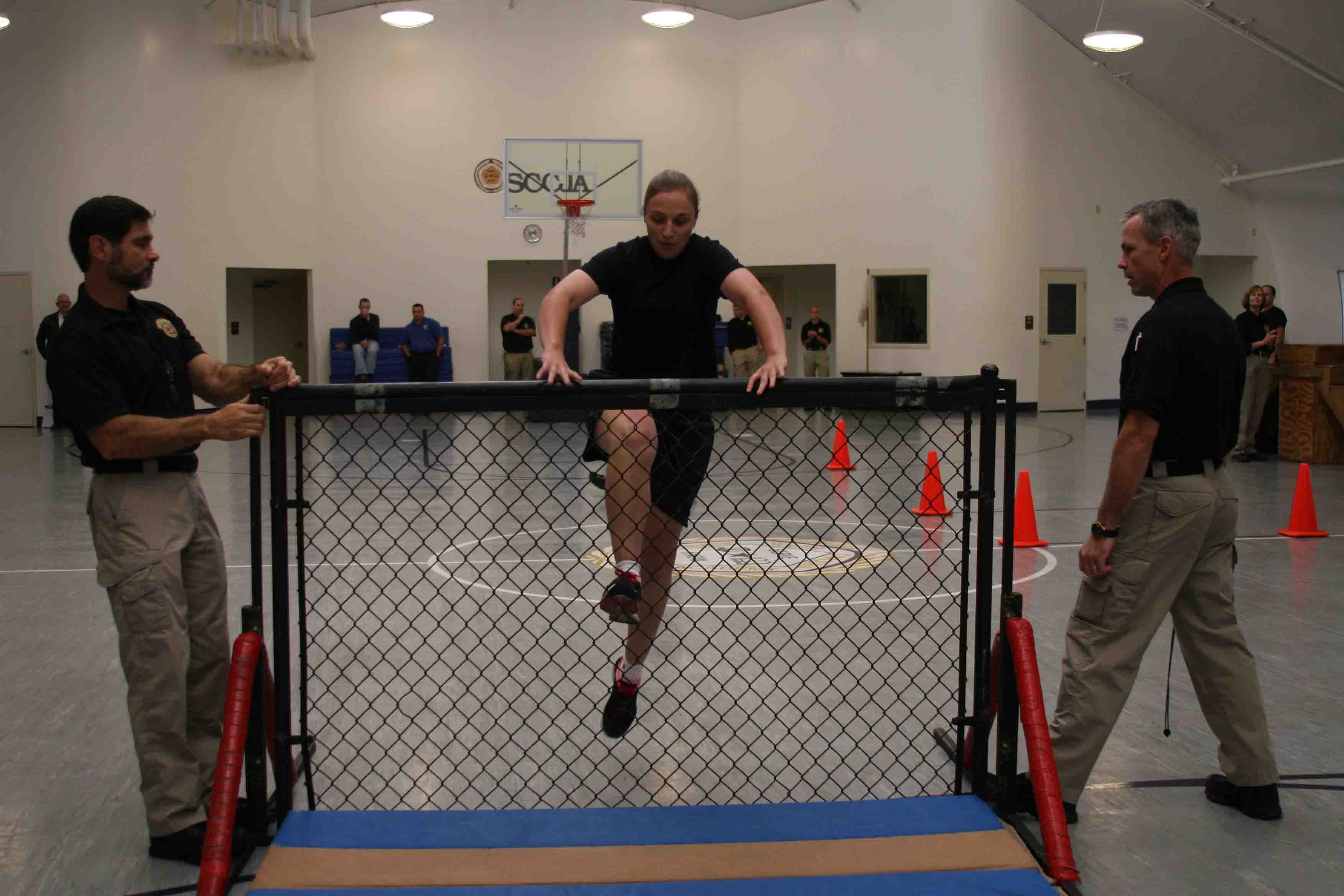Law enforcement officials have sought support from the S.C. General Assembly for a host of changes that would improve officer training and departments' ability to recruit and retain officers.
Here is where things stand:
A reliable source of funding for the S.C. Criminal Justice Academy
Year after year, the academy faces the challenge of planning and delivering training to law enforcement recruits with little certainty about the amount of revenue the agency will receive for operations.

A recruit goes through the S.C. Criminal Justice Academy obstacle course, which must be completed in 2 minutes and 6 seconds. Photo: Florence McCants.
That's because the academy primarily depends on revenue derived from state-mandated assessments and surcharges, which are tacked on to fines and fees collected by law enforcement agencies throughout the state. And that means funding for the academy depends on the extent to which individuals break the law, are then caught and convicted of breaking the law, and whether those individuals can pay the assessments levied as the result of their conviction.
Since 2009, this revenue stream has reportedly decreased by more than $2 million, highlighting its instability. The General Assembly took steps to stabilize this revenue stream. Lawmakers replaced the sunsetting $5 surcharge on every ticket written in the state with a budgeted $3.5 million in recurring funds. But the shortfall persists because the lion's share of revenue continues to be generated by the remaining unreliable assessments and surcharges.
The Association supports ending the academy's dependency on fine and fee assessments and surcharges and instead shifting to a funding model based primarily, if not exclusively, on a recurring budgetary line item tied to a stable source of revenue. A push for stable funding in 2017 was not successful. However, this legislative session, one of the Association's 2018 Advocacy Initiatives is to support the change.
Getting training to cities
This legislative session, the academy will again need an "all hands on deck" approach in its quest to improve law enforcement training in the state. Academy Director Jackie Swindler will be asking for an additional $2 million in recurring funds to be added to his budget. With the additional appropriation, the academy would be able to extend the basic law enforcement training class from 12 weeks to 15 weeks and allow the director to hire training staff for regional mobile training teams.
In the proposed three additional weeks of training, basic law enforcement students will participate in rigorous, scenario-based practical problems — training designed to sharpen their judgment and decision-making skills.
The goal is to improve each officer's ability to respond appropriately to the residents they are sworn to serve, as well as to improve officer safety. This is a win for both the individual officer and residents. The other piece of the proposed training expansion — mobile training teams — would focus on a region of the state and provide supplemental training to every officer in the state during their certification cycle.
These teams will emphasize skills that are easily lost without refresher training, such as handcuffing and retaining control of weapons, including firearms, impact weapons and electronic control devices such as stun guns.
"Some officers never receive this training once they leave the academy," said Tiger Wells, government affairs liaison for the Association. "A regional training approach allows academy instructors to reach more officers than they could with only centralized training at the academy. They would be offering more classes and reducing the travel requirement for officers, particularly from understaffed departments who have difficulty taking time away from their jurisdiction."
Psychological Testing
The General Assembly allocated funding to the academy to implement psychological evaluations for all Basic Law Enforcement Class 1 candidates.
"Police officers are held to a high ethical standard, and a psychological exam is just one more tool agencies use to ensure they hire the best candidates for the job," said Todd Williams, public safety loss control consultant for the Association and a former state and county law enforcement officer.
"These narrowly focused screenings serve as one more way to eliminate police officer candidates who may demonstrate unacceptable or undesirable personality traits. Failing to 'pass' the psychological exam simply means the candidate is probably not the right fit for a job in law enforcement because a day in the life of a police officer can be emotionally, mentally and physically taxing."
All candidates registering for Class 1 Basic Law Enforcement certification training after January 1, 2018, must have a valid psychological evaluation before registering. The requirement also applies to all uncertified candidates hired by a law enforcement agency after October 1, 2017.
It works like this: The hiring agency sponsoring a candidate will be responsible for having the evaluation administered during the pre-employment phase of the hiring process. The academy will reimburse the agency up to a maximum of $300 for each valid evaluation. The academy will only pay for one evaluation to be administered per individual per year and will not pay for evaluations for existing Class 1 certified officers.
During the 2017 legislative session, the Association supported the academy's request for psychological evaluation funding, which the Legislature funded on a recurring basis.
Learn more about these issues at the Association's 2018 Hometown Legislative Action Day on February 6.
